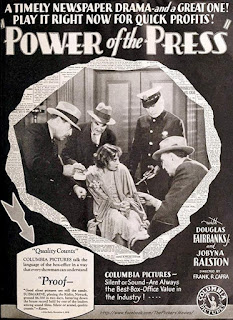23 Mar 2019 at 12:41 am
More Frank Capra.
McIntosh disavows the marriage and when Ralph doesn't show, Viola thinks that's the last she'll see of him but in the film's best scene he struggles through the rain for an encounter anticipating Mai Zetterling's surprise at finding Alf Kellin waiting for her when she knows he should be at the society reception in Alf Sjoberg's 1946 Iris och löjtnantshjärta. Butting the romantic material onto the crowd shouting "Gold Digger" and then Graves' sodden arrival is more substantial than expected in one of these.
Determined to earn a living by joining a road gang, disinherited Raph's' first stroke of the pick hits a water main but the Capra happy fantasy sets in when the lunch Viola makes him proves such a hit with the workers a that he brings a wheel barrow of shoe box lunches to the site and soon is over extended running a "Molly Box Lunch" business out of the old shop fronts (track along the production line) with a labor force that excludes the judgemental neighbors, we notice. We lose the rambunctious kid brothers of the opening too.
Facing competition McIntosh is bluffed into buying them out for a sum, suggested with alphabet crackers by the couple's bogus accountant. Al Boasberg's zooming, shiver or whisper small lettering helps the titling.
By the time we get to his last silent movie, the Frank Capra we can recognize is in place. In 1928's The Power of the Press' news room, reporters pound typewriters while already plausible eighteen year old Doug Fairbanks jr. is stuck with the weather report which editor Robert Edeson cuts to a single line. “Two days before an election and the paper’s about as lively as an undertaker’s gazette.”
The real reporters have left when a phone call comes in alerting Edeson to the
murder of the D.A. and, with no one else about, he sends Doug, who loses the press card tucked in his hat getting him barred from the scene but spots Jobyna Ralston (from the Harold Lloyd movies) escaping through the window. She's identified by parked Wheeler Oakman as the political candidate’s daughter. Our hero rushes back with the scoop which means Jobyna is dragged in for the third degree at HQ and Her dad’s
chances of being elected are zip. Doug is appalled “I
tell you she’s innocent. I saw her cry!” Edeson has the other reporters
throw him out.
I've
been on Frank Capra's case pretty much all my life. I saw some of his
films as first releases. He was one of those Hollywood directors like
George Cukor or Ernst Lubitsch I thought I'd pretty much mined out
decades back. It's an (agreeable) surprise to find there's more.
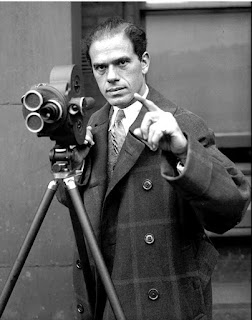 |
| Frank Capra with silent 35 mm. camera. |
We
actually living through through the second Golden Age of film freaking.
The first occurred in the sixties and centered on the Paris
Cinémathèque where the work of many important film makers surfaced often
for the first time outside their home markets - Greta Garbo, Akira Kurosawa, the classic serials of Feuillade, Fritz Lang and Republic. Usually these were first run 35 mm. copies that did them full justice - think tinted early sound films.
Now another kind of narrow casting has peaked. DVD created a market for items that people like Criterion would steer clear of, even if their organizers did recognize them - Mae Murray, Mohamed Hernady.
J. P. MacGowan, Dita Parlo. Now streaming is wiping all that out. Even
people who persist with the old format will find that unfamiliar
material is no longer being produced for their dwindling market and the
hardware will go away.
While it's still possible to trawl these I got onto my missing Frank Capras. I even found the The Ballad of Fulta Fisher's Boarding House, the 1922 two reeler that was Capra's first experience of film making, beginning a series of poem
adaptation he did with one Walter Montague. Rudyard Kipling's verses
are spliced into shots dramatizing the bar brawl that frowsy Mildred
Owens sparks among the rough sea men drinking there. There's nothing
remarkable here beyond the fact that first time director Capra manages
to generate plausible images that cut together quite well. We do get “a
duel of shadows on the wall” anticipating the great Michael Curtiz
sword fights but it's interesting to see how much more effective Curtiz
made his non literal filming of the Jön az öcsém /My Brother John is Coming poem three years before.
The You Tube Copy is foul.That Certain Thing of 1928 is Capra's first Columbia film. It stars Ralph Graves (credits as different as Curtiz' 1929 Glad Rag Doll and the 1949 Batman serial) who would be Capra's repeater leading man in his first Columbia films, here along with Viola Dana, widow of pioneer director John H. Collins who had placed her in the leads of his once admired WW1 era movies.
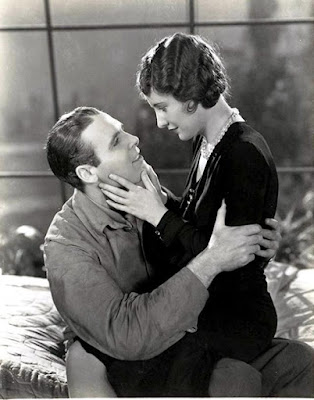 | ||
| Capra's 1930 Ladies of Leisure: Graves with Barbara Stanwyck |
Graves is the son of ABC restaurant magnate Burr McIntosh (the Griffith Way Down East ) whose motto is the Harvey Chain's "Cut the ham thin." Dana is a cigar counter girl whose ambition is to marry rich - bound to be drawn to one another in one of these depression era romances. In his white roadster, Ralph follows her open top bus to get a date and she borrows the fluffy dress from the Jewish tailor neighbor. At the posh restaurant, they kiss behind the fat waiter. She wakes up next morning opposite an empty pillow, with Ralph off buying her gifts his dad's man makes the pages take back.
McIntosh disavows the marriage and when Ralph doesn't show, Viola thinks that's the last she'll see of him but in the film's best scene he struggles through the rain for an encounter anticipating Mai Zetterling's surprise at finding Alf Kellin waiting for her when she knows he should be at the society reception in Alf Sjoberg's 1946 Iris och löjtnantshjärta. Butting the romantic material onto the crowd shouting "Gold Digger" and then Graves' sodden arrival is more substantial than expected in one of these.
Determined to earn a living by joining a road gang, disinherited Raph's' first stroke of the pick hits a water main but the Capra happy fantasy sets in when the lunch Viola makes him proves such a hit with the workers a that he brings a wheel barrow of shoe box lunches to the site and soon is over extended running a "Molly Box Lunch" business out of the old shop fronts (track along the production line) with a labor force that excludes the judgemental neighbors, we notice. We lose the rambunctious kid brothers of the opening too.
Facing competition McIntosh is bluffed into buying them out for a sum, suggested with alphabet crackers by the couple's bogus accountant. Al Boasberg's zooming, shiver or whisper small lettering helps the titling.
By the time we get to his last silent movie, the Frank Capra we can recognize is in place. In 1928's The Power of the Press' news room, reporters pound typewriters while already plausible eighteen year old Doug Fairbanks jr. is stuck with the weather report which editor Robert Edeson cuts to a single line. “Two days before an election and the paper’s about as lively as an undertaker’s gazette.”
The real reporters have left when a phone call comes in alerting Edeson to the
murder of the D.A. and, with no one else about, he sends Doug, who loses the press card tucked in his hat getting him barred from the scene but spots Jobyna Ralston (from the Harold Lloyd movies) escaping through the window. She's identified by parked Wheeler Oakman as the political candidate’s daughter. Our hero rushes back with the scoop which means Jobyna is dragged in for the third degree at HQ and Her dad’s
Doug has just met “the world’s greatest bootlegger” and imitates his voice,
from a ‘phone booth, where Joybna provides background noise (“can you
sing a cabaret song?” - silent movie handling) Doug gets secret witness
Mildred Harris' location. Oakman, in possibly his best outing, demands “Go out and put the muffler on that dame” but the couple prevail and it's time to stop the presses again.
Frederick A. Thompson's script is pure cliché but Capra is already using the news paper background of his great later films. An
interesting departure is in the “Stop the Presses!” sequence where they
actually do that, showing the business of ripping out and resetting the
metal type used to create the plastic impression from which the new
round plate is made before the run can restart - pretty much unique
that. Nothing demanding though not
the usual poverty row stuff with reasonable production, Columbia
running to the odd touch of style - the foreground silhouettes of
candlestick ‘phones. Brisk pace and engaging leads are the assets.
Passable tinted U-Tube copy.
It plays a whole lot better than Capra's next film and his first effort in sound,The Younger Generation a part talkie made at the period where Hollywood was giving up on those.
In
New York's teeming Delancy Street market, Jean Herscholt is is in
animated conversation with the other stall holders. Back in the tenement
flat, his daughter Virginia Marshall is talking across the air shaft to
young Leon Janney confined to his bed with measels. Her hard working
brother Morris doesn’t approve. When an argument develops, the oil lamp gets
thrown on the stove and Marshall and Janney escape on a plank between
the buildings. However the firemen have to retrieve the indignant
brother who is busily gathering family possessions for a fire sale. The
brief fire sequence is the best handled bit of the film with the
convincing wide shot of flames coming out the windows and the fire
engines we'll see passing indistinct through the foreground in the the closer shots.
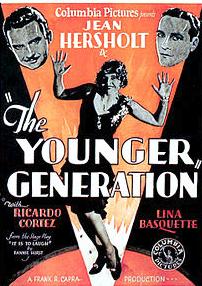 A
montage shows the family used goods stall develop into a second hand
shop, then a store and expanding into a (model shot) emporium under the management of Morris
grown to be Ricardo Cortez. He’s changed his name and moved the family
into a Park Avenue apartment and takes a dim view of the the fact that
sister Lina Basquette (cloche hat and fur with orchid all paid for by
Ricardo) is still seeing old boy friend Rex Lease at the local music
store.
A
montage shows the family used goods stall develop into a second hand
shop, then a store and expanding into a (model shot) emporium under the management of Morris
grown to be Ricardo Cortez. He’s changed his name and moved the family
into a Park Avenue apartment and takes a dim view of the the fact that
sister Lina Basquette (cloche hat and fur with orchid all paid for by
Ricardo) is still seeing old boy friend Rex Lease at the local music
store.The
solid music track with a few tentative effects abruptly gives away to
dialogue when we move into the present. Things do not go well in Park
avenue “How can you be cold in such a nice home?” asks mum Rosa Rosanova, (from the Valentino Blood & Sand).
Jean misses his old Ethnic stereotype friends and is reduced to playing
the delivery guy at cards for his packages - finding with distaste one
is ham.
Pressed
to compete, Lease agrees to take a grand to cause a diversion, singing
on his loud speaker truck outside Kahn’s the Jewelers where the bad hats
are cleaning out the safe - even if we only see them smash a display
case. His song on the track doesn’t match Lease’s lip movements filmed
in exterior wide shot.
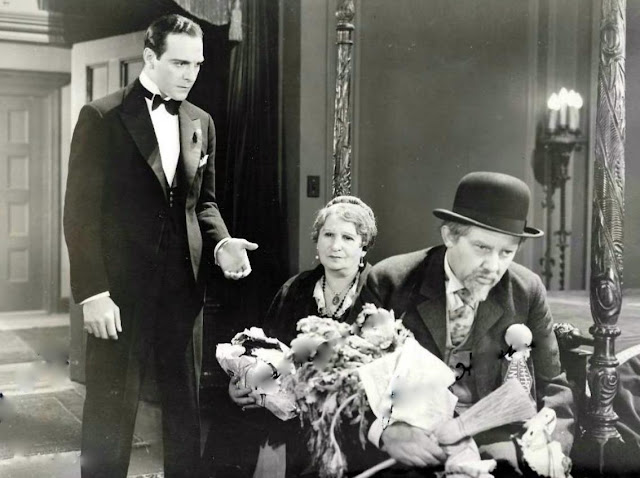 |
| Ricardo Cortez, Rosa Rosanova & Jean Herscholt in The Younger Generation. |
With the cops on his case, Lease is no longer someone Cortez’ sister could
be seen with so she defies Ricardo and marries him. They go to the
station for Lease to turn himself in.
“Going to jail for a little while is better than being hunted all your
life.” Desk Sergeant Clarence Burton is possibly the one recognizable
Capra character, showing sympathy for the young couple, like Harry Carey
with Edward Arnold at You Can’t Take It With You’s night court.
She
takes the new baby in a pram to see his dad through the bars at the
jail gate where Rex’s allowed to pause loading sacks. Ricardo put
Lina’s bags in the foyer and hides her letters home. When Rex is
released from the Big House the couple set up together. Lina has managed
to sell one of the songs for a grand - highly unlikely on the evidence
of those we hear. Jean tracks down the young couple through old
neighbor Martha Franklin, Rex’ mum. They get a little boy to read a
letter Lina sent her, which Jean can’t. He discovers he’s a grandfather.
Things reach a peak when Herscholt and Rosanova come back home
loaded with purchases for the baby and the door man won’t let them in,
embarrassing Ricardo who is exiting with the rich family we suspect he
wants to marry into. He passes his parents off as a delivery crew - with
his prospective father in law not looking convinced.
The
old couple move out immediately but Herscholt falls ill with the
exhaustion. Ricardo letting Basquette and Lease bring the baby revives
him and, as soon as he’s better, the olds go to live with the couple
leaving Cortez in the luxury flat with only the butler. They do the
shadow of the Venetian blinds falling over him to suggest isolation a
second time, which is pushing their luck.
The players bring no sparkle but at least don’t look nervous. Basquette is the most conspicuous. She was De Mille’s The Godless Girl which made her a hit in Soviet Russia. She soon gave up acting and bred Great Danes for movie stars.
I suppose you could see this dreadful ethnic weepy
offering only a certain proficiency in the staging of the
silent sequences, as another statement of the Capra happiness before
money message but that’s drawing a long bow. The Sins of the Children made a year later by Sam Wood
at Metro is very similar - lovable European (means Jewish) dad distanced from
the son who has changed is name but that one is so much better.
Younger Generation is also bit like Leo MacCarey's 1930 Wild Company with some father knows best, here mixed in with the migrant thing, but Capra's film is genuinely awful. Seventy minutes seems like two hours plus. Dull script & performance but quite good choice of angles and editing. Nothing like the flashes of real Capra in the earlier That Certain Thing. OK copy on DVD cropped left probably to accommodate the sound on disk format.
I've
just acquired six hundred discs from this period (be careful what you
wish for) and seeing them bunched up I become aware of the subjects that
critics and audiences began to deride in this period - mother love,
assimilation, red-rabble rousers, ungrateful children.
In only a few years Frank Capra would redeem and abandon these in some
of the most cherished films we have. Searching the early films for evidence of the Capra talent makes them intrigue.
Barrie Pattison 2019
